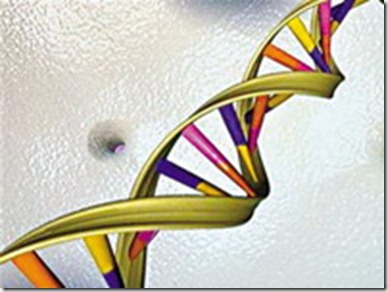【Science】英国研究证实合成“XNA”可像DNA一样工作和演化
Science:英国研究证实合成“XNA”可像DNA一样工作和演化
2012/04/24 14:15:25

英国剑桥大学研究人员已经制作了一套合成的多聚物,它们能以DNA工作的方式来储存和复制信息。它们也可在实验室的条件下以一种类似于演化的过程变化。相关论文4月20日在线发表于_Science_。
Gerald Joyce在一则相关的《观点栏目》中写道:“这项研究预示着合成遗传学时代的来临,并对外空生物学、生物技术以及对生命本身的理解都有意义。”所有的 DNA都是由4种核苷酸碱基组成的——常常被称作A、G、C和T——它们是沿着一个由糖和磷酸基团组成的主干排列的。Vitor Pinheiro及其同事们现在描述了合成的、核酸样的”XNA”分子的定向演化,其分子中的天然的糖成分被6种替代物中的1种所取代。所有这些XNA分子都与互补的RNA和DNA相结合。研究人员还设计了可从一个DNA模板来合成XNA的多聚酶,而其他的多聚酶可反向将XNA转录到DNA。这一系统使得由XNA编码的信息得到复制,而这正是遗传的基础。最后,Pinheiro及其同事们将这些多聚物中的一种叫做HNA的多聚物置于类似于自然选择的实验室条件的影响。正如人们预测DNA在这些条件下会发生的情况那样,该HNA演化成为一种紧密且明确地与特定标靶结合的形式。
Joyce在其《观点栏目》中说,XNA的合成生物学研究可能永远无法赶上那些涉及到RNA的研究,因为RNA的准备较为容易并且有更多的用于对其分析的工具。不过,他指出,XNA分子不受那些降解DNA和RNA的天然酶的影响,因此它可能在材料科学、分子诊断学和治疗学上有不同的潜在应用。他还警告说,合成生物制剂必需受到控制以避免踏入可能会潜在损害我们生物学机制的领域。
Synthetic Genetic Polymers Capable of Heredity and Evolution
Vitor B. Pinheiro, Alexander I. Taylor, Christopher Cozens, Mikhail Abramov, Marleen Renders, Su Zhang, John C. Chaput, Jesper Wengel, Sew-Yeu Peak-Chew, Stephen H. McLaughlin, Piet Herdewijn, Philipp Holliger
Genetic information storage and processing rely on just two polymers, DNA and RNA, yet whether their role reflects evolutionary history or fundamental functional constraints is currently unknown. With the use of polymerase evolution and design, we show that genetic information can be stored in and recovered from six alternative genetic polymers based on simple nucleic acid architectures not found in nature [xeno-nucleic acids (XNAs)]. We also select XNA aptamers, which bind their targets with high affinity and specificity, demonstrating that beyond heredity, specific XNAs have the capacity for Darwinian evolution and folding into defined structures. Thus, heredity and evolution, two hallmarks of life, are not limited to DNA and RNA but are likely to be emergent properties of polymers capable of information storage.